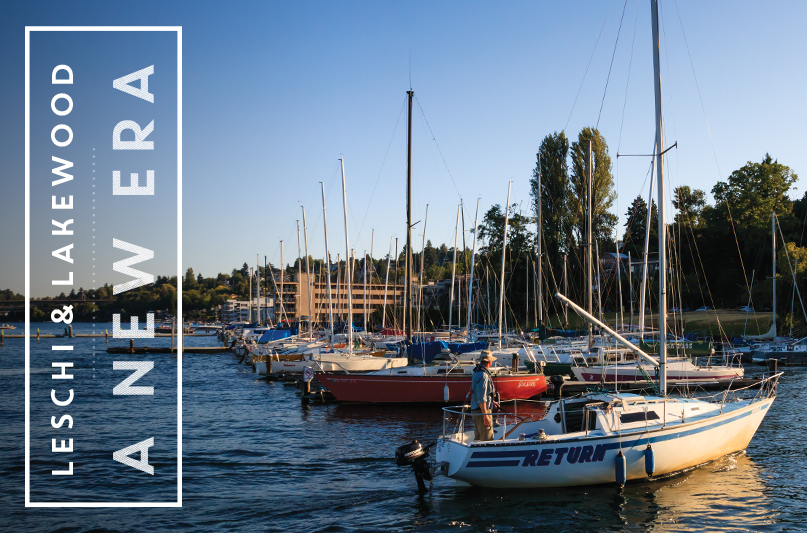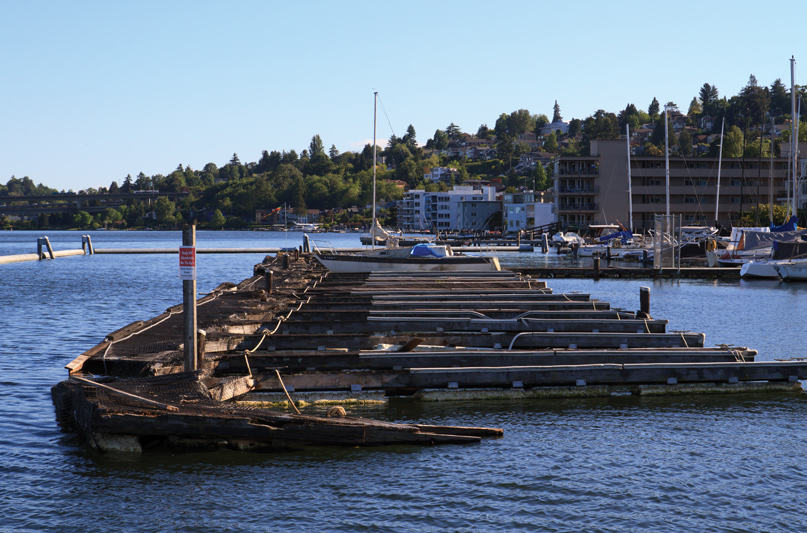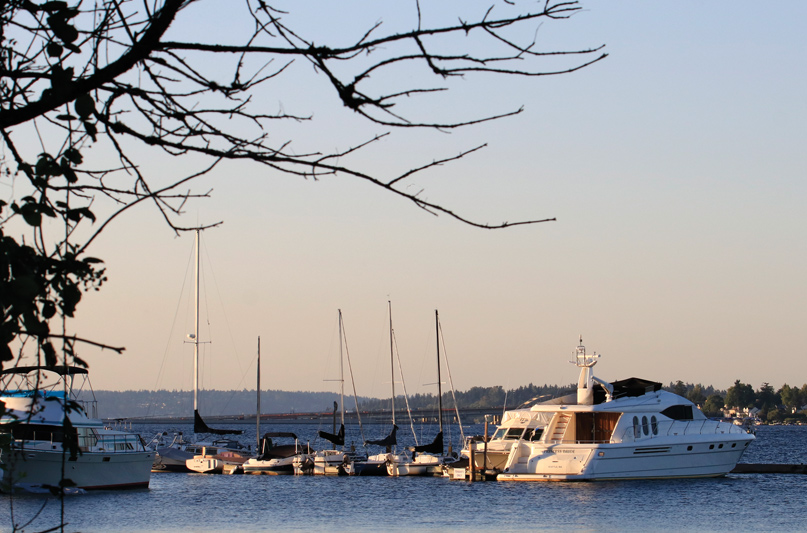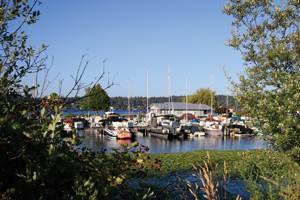
 Two years ago, the public forum was abuzz after the Parks and Neighborhood Committee of the City Council of Seattle (the City) chose to overturn an approved 2013 proposal from Foss Waterway Management (FWM) that sought to redevelop the deteriorated Leschi and Lakewood marinas. Deterioration is swift on the water and at the time of our June 2016 reporting, approximately 38 of the 214 (about 18%) of Leschi Marina’s wet-moorage slips were in such a dilapidated state, even sinking, that they were unusable. A walk across the floating dock was also hazardous at places with gaping holes where lumber had long rotted away. A revised proposal from FWM that aligned more with the public’s desire for a community marina was accepted by the City almost three years later.
Two years ago, the public forum was abuzz after the Parks and Neighborhood Committee of the City Council of Seattle (the City) chose to overturn an approved 2013 proposal from Foss Waterway Management (FWM) that sought to redevelop the deteriorated Leschi and Lakewood marinas. Deterioration is swift on the water and at the time of our June 2016 reporting, approximately 38 of the 214 (about 18%) of Leschi Marina’s wet-moorage slips were in such a dilapidated state, even sinking, that they were unusable. A walk across the floating dock was also hazardous at places with gaping holes where lumber had long rotted away. A revised proposal from FWM that aligned more with the public’s desire for a community marina was accepted by the City almost three years later.
Today, a visit to the marina will yield much of the same. Fortunately, even though the on-water conditions of the marina continue to decline, some key land-based developments have made the future of the marina a little brighter.
If we flash back to the spring of 2013 when the City’s first Request For Proposal (RFP) was issued to develop Leschi and Lakewood marinas, hope for some and angst for others ran at an all-time high. The marinas as they stood were familiar, having been operated by concessionaire Schober and Associates for 28 years. However, the public funding of the marinas were drying up and taxpayers remained unmoved. Small marinas that cater to tenants on the order of dozens are generally a more difficult public funding pitch than something like a community center that services thousands.
“We had the opportunity to repair and replace the marina for an ongoing contract,” said Dwight Jones, a partner of FWM. “We had a new vision of what Leschi Marina could be, and we didn’t want to bore people and be predictable. We weren’t given any instructions, so we thought of something new.”

The FWM proposal was chosen over a bid by the old guard of Schober and Associates and their proposal was made public. The original plan envisioned a boater clubhouse and notably larger slips for larger yachts. The culture shock was felt by some as the small-craft oriented Leschi Marina was largely defined by its active Thistle fleet and the club dragon boats. The new plan was more akin to Elliott Bay Marina, one of the successful projects on the Dwight Jones’ portfolio.
“We want the marina to stay, but we don’t want it expanded with big boats,” said Diane Morris, Co-President of the Leschi Community Council at the time. “We don’t want big boaters and motorboats coming in because it’s hard on the shoreline. We have kids that swim down there and motor traffic can be dangerous to them.”
“Big yachts be warned” was the takeaway message for both Leschi and Lakewood marinas. Lines were drawn in the sand and public hearings became very contentious. Ultimately, the City nullified the 2013 proposal due to the public opposition. The community, for better or for worse, was back at square one as Leschi Marina sank ever deeper into Lake Washington. In 2014, the engineering firm Reid Middleton Inc. estimated $11 million was needed to make the necessary repairs for Leschi alone. The future looked bleak.
All was not lost, however. Out of the ashes of the nullification arose another RFP from the City to fix up the marina, and Foss put forth another bid. After a very public process, the City and FWM penned an agreement to negotiate a contract in late 2015. The new vision from FWM seemed to sit better with the community at large and made clear revisions to retain the small-boat, paddler-accessible, public-oriented spirit of the marinas as people knew them. What’s more, the City offered to pitch in $4 million in the development effort compared to the original public contribution of zero. Clearly, all parties were more hands-on this time around.

“Now that it’s been settled with Foss, I feel pretty good about them,” said Diane Snell in 2016, when she was co-president of the Leschi Community Council. “They understand our sailing heritage and I think they’ll do a good job. I’m tentatively optimistic and Dwight Jones of Foss is great to work with.”
“We want to be inclusive, not exclusive,” said Jones in 2016. “I think everyone will be pleased. The whole facility will improve and there will be better accessibility for everyone. Kayaking access, great waterfront views, and better facilities help everyone.”
Progress continued as more parties coalesced around the new initiative. Notably in August of 2017, the City passed legislation (Ordinance Number: Ord 125391) with sponsor Debora Juarez authorizing Seattle Parks and Recreation to enter into an official lease agreement with Marina Management LLC (MM, formerly Foss Waterway Management). In a move that made the public-private partnership official, the City and MM moved to renovate both marinas–Lakewood and Leschi.
“In August 2017, Seattle City Council passed legislation authorizing Seattle Parks and Recreation to enter into a lease agreement with Marina Management LLC. This partnership with Marina Management LLC will enhance the City-owned marinas and improve public access to these spaces,” says a Seattle Parks and Recreation statement published on January 2, 2018. Together, the two entities planned to work together on the projects, which totaled at an estimated $16 to $18 million. With the City’s capital improvement allocation, now $3.8 million, MM had the greenlight to make up the rest and deliver as a tenant. MM officially took over management on January 1, 2018.
The ink of the new ordinance was still drying when it was met with a filed lawsuit on September 7, 2017. The suit was filed by the Friends of Lakewood Moorage (FoLM), a group of “concerned tenants and neighbors of Lakewood Moorage, with a mission to preserve the history, character, and charm of Lakewood Moorage” who remain unconvinced that a private-public partnership with MM is the solution to the marina’s woes. They sued the city with the mantra “Leave Lakewood Alone.”
“We’re trying to keep Lakewood a neighborhood moorage,” Jeannie O’Brien, local attorney and president elect of FoLM, told us in a recent interview. “This part of the lake just isn’t meant for big yachts.” FoLM has proposed methods like public debt financing paid back with moorage revenues to keep it virtually as is and entirely public versus the new private-public MM plan to incorporate larger slips, a pump-out facility, and other amenities meant to grow boating activity. O’Brien doesn’t want to attract more boats or change the layout of the marina, citing safety, environmental, and higher slip fee concerns. She also referenced the history of the public moorings that have roots back to 1910 when Lake Washington was flooded as part of the Miriam M. Chittenden Locks system. According to her, the public moorage was a promise to property owners who lost out with the rising water.
Again, the battle lines were drawn, but this time the tide had turned. The case of FoLM vs. City of Seattle was heard before Judge Catherine Shaffer on Friday, April 6, 2018. The gavel sealed the legal challenge for good on May 9, 2018. Judge Shaffer denied FoLM’s motion without comment. The public-private plan would proceed.
Although major renovation has yet to take place after the legal victory for MM, evidence of the new management has already begun to appear. The new general manager, Craig Perry, is a seasoned marina manager with MM who used to preside successfully over Delin Docks Marina on the Thea Foss Waterway of Tacoma. Evident in his regular e-newsletters is the roll-up-your sleeves attitude associated with a new homeowner of a fixer-upper. More and regular office hours, larger staff, increased parking enforcement, and new security cameras paint the picture of a marina-managing Mary Poppins or a Doberman pincher sent by the invading bourgeoise depending on who you talk to. If interested, a great resource to follow is the e-newsletter posted on leschiandlakewood.com in the news section, and you can even get them sent right to your email inbox.
Notably, the State Environmental Protection Act (SEPA) documents have been completed in MM’s ongoing contraction with local company Marine Floats. This is a critical landmark accomplishment as far as fixing up the docks is concerned. The optimistic timeline is that actual renovation of the floating docks could begin in the summer of 2019. Within the same announcement, Perry also adds, “If everything goes as planned, which it seldom does.” When talking about this saga, optimism and fatigue are often expressed at once.
But, as Perry predicted in his newsletter, Lakewood plans are made to be challenged. At the time of this writing, another suit has been filed against the MM and City partnership by FoLM (June 15, 2018), perhaps opening another salvo exchange between the two sides. Details on this lawsuit are developing.
As one walks the docks of Leschi or Lakewood, one still sees the sinking docks and general signs of neglect. However, change is in the air, and a sense of law and order has descended. Red parking tags hang from cars and a security camera watches the gate. It seems like a few of the more derelict boats are gone, and the marina office is *gasp!* open and tended to during normal hours.
How widespread is the resistance? Hard numbers are difficult to quantify as no formal polling or voting data exists. It’s fair to say that favor for the developments has increased since the pitchfork meetings of 2013 that lead to the nullification of the original agreement with Foss. Even the stance of the City has evolved from quickly yielding to public pressure in 2013 to judging in favor of the MM agreement without further comment this year. Inertia seems in favor of development with the City, MM, and at least a sizeable portion of the community having picked their course.
Time will tell if any new challenges shake the ship’s inertia off its bearing. Meanwhile, the floating docks still sink into the lake as they did when we investigated two years ago. The silver lining is that, unlike two years ago, the marina offices are open and somebody inside is trying to do something about it.

